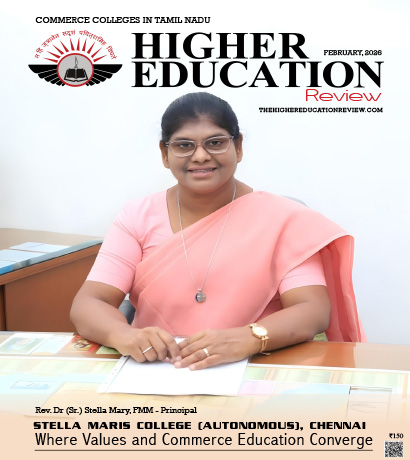Impact of Cross-Border Learning on Globally Career-Ready Grads
 Nitish Jain, President, SP Jain School of Global Management in an interaction with Higher Education Review shared his views on how cross-border learning experiences enhance global competency and intercultural communication skills for graduates, how international programs improve employability and career readiness in competitive global job markets, strategies that graduates can use to effectively translate cross-border learning experiences into tangible career advantages and more.
Nitish Jain, President, SP Jain School of Global Management in an interaction with Higher Education Review shared his views on how cross-border learning experiences enhance global competency and intercultural communication skills for graduates, how international programs improve employability and career readiness in competitive global job markets, strategies that graduates can use to effectively translate cross-border learning experiences into tangible career advantages and more.
How do cross-border learning experiences enhance global competency and intercultural communication skills for graduates?
You can't learn to swim by reading about water. The same applies to global business.
Can your graduate walk into a negotiation in Dubai and instinctively know that pushing for closure in the first meeting damages the relationship? Can they recognise when their communication style isn't landing? These aren't things you learn from case studies or a month-long study trip. They come from repeated navigation of real situations. And yes, from failing and adjusting.
I have seen graduates freeze in their first international job because nobody taught them that business hierarchy in Asian markets isn't optional, it's oxygen. Meanwhile, others hit the ground running because they have already navigated three different cultural contexts and developed pattern recognition.
The difference shows up in salary negotiations. Employers pay premium for graduates who won't need six months of expensive on-the-job cultural training. They want people who have already been tested.
In what ways do international programs improve employability and career readiness in competitive global job markets?
The job market isn't one market. It's dozens of disconnected markets with different hiring cycles, visa policies, and demand curves. When tech layoffs hit the US, Dubai is hiring. When Australia tightens immigration, Singapore needs talent.
A graduate with only domestic experience has one shot - one market, one network, one understanding of how recruitment works. If that market crashes or their visa gets denied, they are starting from zero. Someone who's lived and worked across markets has built parallel career paths. They interned in Dubai and know which recruiters place people. They have references in Singapore who understand their capabilities. They know how Australian companies hire differently from American ones. This isn't theoretical. When COVID hit, I watched graduates with multi-market experience pivot to regions that were still hiring while their single-city peers were stuck in frozen job markets.
International programs create career insurance but only if they put you in those markets doing real work, not just taking classes about them.
How can exposure to different academic systems and work cultures influence leadership and problem-solving abilities?
It kills the assumption that ‘your way is the right way.’ Students educated in a single system think their approach is universal. American graduates believe open debate wins. Asian graduates know that challenging your boss publicly ends careers. Both think the other is wrong. Neither is. They are contextual.
A leader with one playbook fails when context changes. A leader who's navigated multiple systems knows when to decide quickly versus when to build consensus first. They read the situation and choose the approach that works. It is the same with problem-solving. Single-system graduates see one solution path. Multi-system graduates see several because they have watched different markets solve identical problems differently. That pattern recognition is the advantage.
What role do cross-border internships and study programs play in networking with international industry professionals?
When you work with someone for three months on a project or an internship where they watch you handle pressure, meet deadlines, and solve problems, you are not networking. You are building professional credibility.
The difference is everything. A LinkedIn connection can't get you a visa or vouch for your work ethic to a sceptical hiring manager. Someone who supervised your internship in Dubai and saw you deliver, they can. These relationships have currency in their markets. When you apply for a role in Singapore three years later, a reference from someone who actually worked with you there carries weight that your business school professor's recommendation never will. I have watched this play out repeatedly. A graduate lands a role because their internship supervisor vouched for them. A consulting project from two years ago turns into a full-time offer because the client remembered their work.
How do cross-border learning experiences contribute to innovation, creativity, and adaptability in professional careers?
Put a student in a market where their usual approach doesn't work, and watch what happens. They can't rely on the network they built at home. The communication style that made them successful suddenly makes them invisible. The problem-solving toolkit they have always used doesn't fit the constraints.
That discomfort forces innovation and creativity. You figure out how to influence without authority when hierarchy blocks you. You learn to build trust without the cultural shortcuts you are used to. You solve familiar problems with completely unfamiliar resources.
Here is what this does long-term: it kills the arrogance that there is only one way to succeed. Professionals who have been humbled in multiple contexts stay curious. They don't assume their first idea will work. They test, adjust, ask better questions.
What skills gained through cross-border programs are most valued by recruiters in emerging industries like AI, sustainability, and fintech?
Comfort with ambiguity and constant change. Emerging industries don't have playbooks yet. What worked six months ago is outdated. Regulations are being written as you operate. Best practices don't exist because nobody's figured them out.
Cross-border experience prepares you for this because you have already operated without clear answers. You have figured things out when there was no manual, no precedent. That's exactly what working in AI or other emerging sectors feels like daily. Recruiters also value speed of learning and unlearning. These industries require you to drop assumptions fast when evidence contradicts them. If you have had to scrap your approach multiple times because it failed in unfamiliar contexts, you know how to adapt quickly.
The third is problem-solving under constraints. Emerging industries don't have ideal conditions. It has Imperfect resources, unclear regulations, and infrastructure gaps. If you have already learned to deliver despite messy conditions, companies don't need to train you.
How do cross-border experiences help students navigate ethical, social, and regulatory differences in global workplaces?
They learn that the concept of "right" isn't universal, and that's uncomfortable. What's legal in one market is corruption in another. Gift-giving builds relationships in some cultures and violates bribery laws in others. Social norms around hierarchy and gender dynamics shift completely across borders. Cross-border experience forces you to develop judgment. You learn to ask: What's the local standard? What's my line? Where do those conflict, and what am I willing to walk away from?
Students who've worked across markets develop pattern recognition. They have faced situations where local custom conflicted with their values. They have had to choose between adapting and compromising.
The skill isn't imposing your framework everywhere. It's knowing where you can flex and where you can't, and being able to articulate “why” to colleagues who don't share your context.
How does participation in international research projects or collaborative courses impact long-term career trajectories?
It teaches you something most graduates never learn: how to produce something meaningful with people you can't control. Research projects with international teams mirror exactly what corporate work looks like - distributed teams, unclear ownership, competing priorities, and a deliverable that requires everyone's contribution. If you can navigate that successfully in an academic setting, you have built capability that translates directly.
Here's what compounds over time: co-authors become collaborators. The industry mentor who supervised your research in Singapore becomes a reference when you are interviewing for a role there five years later. The insights from that project become expertise you leverage in your career.
What strategies can graduates use to effectively translate cross-border learning experiences into tangible career advantages?
Target roles where multi-market understanding helps solve real business problems such as regional expansion teams or companies operating across markets you’re familiar with. If the job description doesn’t mention international work, your cross-border experience is likely not relevant.
Second, build a portfolio of work from each market. Internship projects, consulting work, research or anything that shows you delivered results in that context. Employers want proof you can perform, not just adapt. Third, maintain active professional networks in each location; actual relationships with people who can vouch for your work. When a hiring manager checks references across markets, that validation is powerful.
Fourth, stay current on business developments in those markets. If you spent time in Singapore, follow regulatory changes, economic shifts, industry news. In interviews, demonstrate that your knowledge is current, not outdated. Fifth, get clear on visa and work authorisation pathways for markets you have worked in. Many companies need people who can legally work in multiple jurisdictions. That is a practical advantage most graduates overlook.
About the author:
Nitish Jain is the President of SP Jain School of Global Management, a leading business school with campuses in Dubai, Mumbai, Singapore, and Sydney. A visionary educationist and entrepreneur, he has been instrumental in shaping SP Jain’s global footprint and innovative approach to business education. Under his leadership, the institution has gained international recognition for its tri-city model and emphasis on global intelligence, technology, and experiential learning

